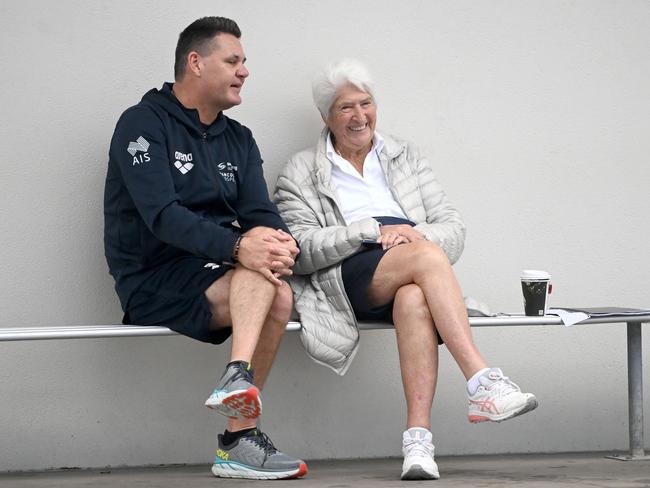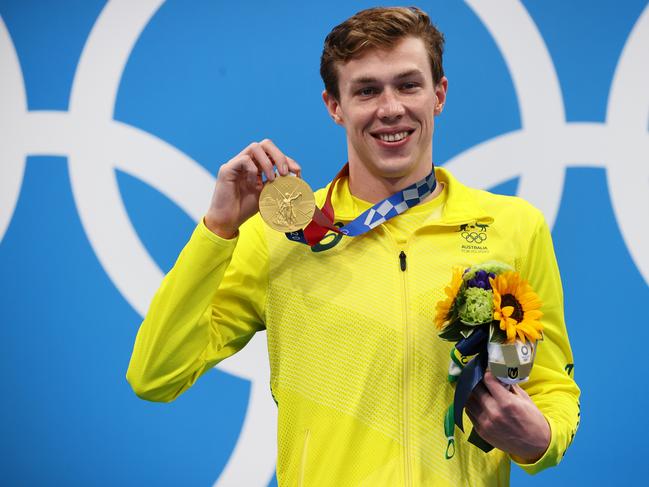Olympics 2021: How Aussie swimmers got their golden groove back in Tokyo
Australia’s success in the pool in Tokyo has put the failures of Rio and London in the rear view. Julian Linden on how the Dolphins’ program was rebuilt from the ground up.
Olympics
Don't miss out on the headlines from Olympics. Followed categories will be added to My News.
The rebuilding of the Australian swimming team after the disappointments of London and Rio was well under way when the team performed admirably at the 2019 world championships – but things were not going smoothly out of the water.
Despite having the backing of mining magnate Gina Rinehart, the organisation was struggling for money and credibility, after the fallout from Shayna Jack’s positive doping case put the spotlight on the administrators instead of the swimmers.
The swim team lacked a major sponsor, then Channel 7 announced it was not going to broadcast the Olympic trials, forcing Swimming Australia to find a new partner while, at the same time, laying off staff.
It eventually signed a deal with Amazon and, while the viewing figures were healthy, they were well below what they would have been on free-to-air.
Major changes were also happening inside the administration.
John Bertrand, the former America’s Cup-winning skipper, stood down as president after seven years at the helm and was replaced by Kieren Perkins.

Leigh Russell quit as chief executive and was replaced by Alex Baumann, the former Canadian gold medallist who had been working in high performance. And Jacco Verhaeren, the Dutch master who had been recruited as the first foreign head coach to clean up the “toxic culture” after the 2012 London Olympics, announced he was returning to Europe with his family.
He was replaced by Rohan Taylor, who had coached Leisel Jones to Olympic gold in 2008.

Having spent many years living in the US, Taylor has a distinctive American accent but is also a big believer in the American collegiate swimming culture, where the emphasis is on teams rather than individuals.
Given only a 12-month contract, Taylor had no time to waste, but figured that the fastest way to success was building a better team culture, so he made that his top priority.
It was a masterstroke.
He immediately began holding fortnightly meetings with coaches, but not just the coaches of the swimmers he expected to make the team for Tokyo. With an eye on Paris 2024, he invited every coach he thought could benefit from tuning in, and restarted the youth programs that had slipped through the cracks.

He also invited coaches from other sports to join the Zoom calls to offer tips and advice about how they were managing their athletes through the pandemic.
Former Collingwood coach Nathan Buckley was one of the first to address the coaching group, along with Justin Langer, the Australian cricket coach who was a close contact of Swimming Australia’s media officer Kate Hutchison.
More than anyone else, Langer’s talk hit the right notes.
He had taken over as Australian cricket coach after the ball-tampering scandal in South Africa, so was not only instrumental in trying to win matches, but was also engaged in winning back the public’s trust.
“He was awesome. You wanted to run through a brick wall after him,” Taylor said.
“He’s so passionate about his team and his players and everything. He was very good.”
The rebuilding process had already begun under Verhaeren when the Dolphins won five gold medals at the 2019 world championships in Gwangju, South Korea.
But the team’s success was completely overshadowed by events outside of the pool.
The world titles were not broadcast on Australian television, and the biggest headlines were Mack Horton’s refusal to join Sun Yang on the medal podium and Jack’s positive drugs test.
Four of the five gold medals had come in relays – with Ariarne Titmus the only individual winner – and while things were coming together well, the team was still a work in progress and in a race to be ready for Tokyo last year.
“I still think we would have had a good result (had Tokyo gone ahead in 2020), because the team was heading in the right direction,” Taylor said.
“But, to be honest, I don’t think we would have won as many medals as we did if the Games had gone ahead in 2020.
“The extra 12 months definitely worked in our favour because it gave a lot of the swimmers, especially the younger ones, that little bit of extra time to develop.”
The benefits of those extra 12 months are clear.

Of the nine gold medals the Dolphins won at these Games, just two came from relays. The rest were split between four swimmers: Emma McKeon, Ariarne Titmus, Kaylee McKeown and Zac Stubblety-Cook, who all benefited enormously from the delay,
Before the postponement, Australia’s most versatile swimmer McKeon, who won a record seven medals in Tokyo, had been basing her program around her 200m freestyle in which she had won a bronze medal in Rio.
She and her coach Michael Bohl always figured the 200m was her best chance of winning an elusive individual gold medal, but it wasn’t until December 2020 that they realised the sprints might be a better option.
So as recently as December 2020, they decided to “roll the dice” and focus all McKeon’s attention on the shorter distances.
Already a textbook swimmer, McKeon was instructed to spend less time in the water and more in the gym to build up her strength, and it paid off big time when she won the 50m and 100m finals.
Titmus had a different problem. She had beaten American legend Katie Ledecky to win the 400m freestyle gold at the 2019 world championships, but injured her shoulder at the end of 2020.
She missed almost three months of training, but the timing was perfect and she made it back for Tokyo.

No one knows how McKeown would have performed had the Games taken place in 2020. She was in great physical shape, but her father’s health was rapidly deteriorating at the same time, and he died in August.
Determined to honour her father, she was inspired in 2021, and came away from Tokyo with three gold medals.
Stubblety-Cook was Australia’s most unexpected winner in the pool. He was ranked fifth in the world in 2020 and still on a steep learning curve. He peaked in 2021, rising to No.1.
The key decision that led to Australia’s success in Tokyo was the first one made.
The moment the Games were called off last year, Swimming Australia went straight to John Coates, the president of the Australian Olympic Committee and vice president of the International Olympic Committee, and asked him whether the Games would go ahead in 2021 or if the IOC was just stalling.
When Coates assured them the IOC was determined to push ahead, Swimming Australia went straight back to work without wasting another minute.

“That first decision was probably the most important,” Taylor said.
“There was a lot of uncertainty and confusion about whether the Games would go ahead, but we went all in.”
In the initial phase of the lockdown, when nearly all the top swimmers were unable to train, Swimming Australia campaigned hard to get them back into the pool as quickly as possible.
It also told the top swimmers that anyone who got selected for the team would have to go straight to Queensland the moment they were picked to avoid any risk of getting infected or trapped at home.


It was another masterstroke because the team arrived in Tokyo fit and raring to go.
Significantly, Taylor also reintroduced a team-bonding camp for the start of 2021.
The camps were a tradition started by Don Talbot, who died last December, but were ditched by Verhaeren, who didn’t see the value in them.
Taylor used the camp as a team-building exercise but also to challenge swimmers, handing them physical and mental assignments without warning to prepare them for the challenges ahead at the most unusual Olympic Games ever held.
An old-school coach more at ease prowling the pool deck with a stopwatch in hand than sitting in management meetings, Taylor also made two other key decisions.
He encouraged everyone just to be themselves, which helps explain why Dean Boxall celebrated so wildly when Titmus won the 400m freestyle, and why McKeown inadvertently swore on national television after her win in the 200m backstroke.

And he supported the coaches and swimmers who decided to go against all their instincts and not be greedy by taking on too many events.
McKeon and Kyle Chalmers both dropped the 200m freestyle, and McKeown pulled out of the 200m individual medley even though she was ranked No.1 in the world.
“I wouldn’t say we got lucky because there’s no luck in winning Olympic gold medals, but a lot of things went our way that maybe haven’t in the past,” Taylor said.
“But this is just the beginning and we’re already working on Paris 2024.
“There’s still more work to be done.”






